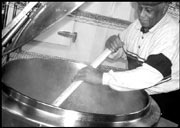THIS WEEK, justice is green.
After more than four years of protest and litigation, the Washington state Liquor Control Board finally agreed on April 22 to pay $525,000 to settle Oscar and Barbara McCoy’s lawsuit over the suspension of the liquor license for Oscar’s II, their Central Area restaurant. When combined with the city’s settlement of $675,000 in February for its attempt to shut down the restaurant entirely, that works out to $1.2 million worth of we-really-really-screwed-up. It also represents total vindication for the restaurateurs who refused to let the government destroy their livelihood.
The McCoys ran into trouble with the law after the crack epidemic invaded their neighborhood in the late 1980s. They cooperated with the police in an effort to combat drug trafficking and gang violence in and around their establishment but made little progress (note to authorities: The drug war cannot be won). Eventually, the police decided it would be better to shut down Oscar’s II rather than work with the McCoys. So the cops initiated a series of undercover drug buys inside Oscar’s II in order to build a case that the restaurant should be shut down under the city’s drug abatement law. When the city moved to close the doors, the Liquor Board piled on by suspending the restaurant’s liquor license.
The state Court of Appeals eventually ruled the city’s actions were unconstitutional—basically the government can’t seize somebody’s property based on evidence the cops manufacture in secret. The Court of Appeals also ruled that the Liquor Board’s suspension was wrong.
These rulings gave the McCoys the keys to the vault. And their lawyer, David Osgood, made sure they could use them.
The crusading Osgood hopes the fallout will result in tangible changes in the way the city conducts its drug war. He also hopes the Liquor Board will alter its heavy-handed approach to regulation of clubs and restaurants. There is no evidence of any such changes as yet. In fact, Osgood is just starting on another Liquor Board case. “If they haven’t learned their lesson, I’m willing to try it again,” he says gleefully.
George Howland Jr.








